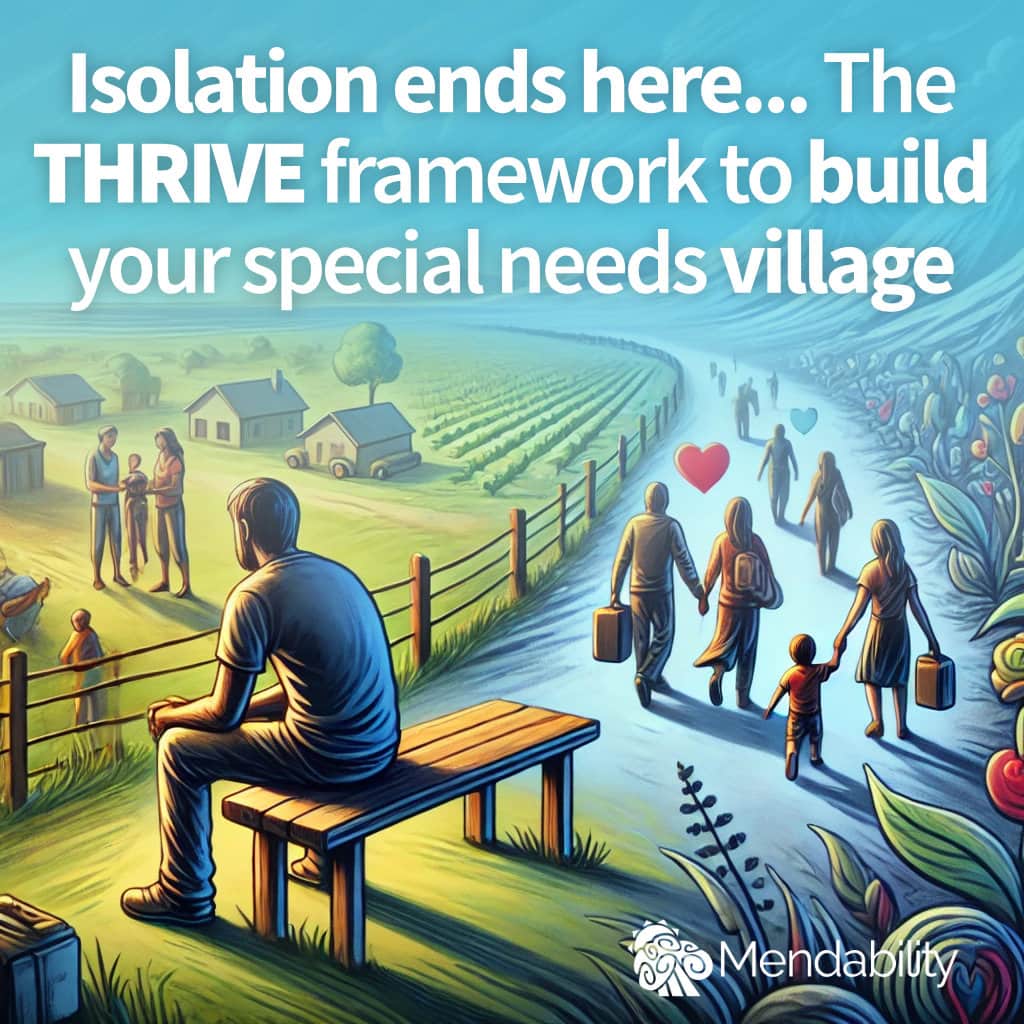Ever feel like you’re navigating the world of special needs parenting all by yourself?
You’re not alone.
Isolation is a common experience among parents of children with neurological conditions, but it doesn’t have to define your journey.
In a recent conversation with Michelle Choairy, a parent who’s walked this path, we explored practical ways to move from isolation to connection. Michelle shared her T.H.R.I.V.E. framework—a powerful tool designed to help parents build a supportive community, navigate complex systems, and celebrate the small wins that make all the difference.
YouTube Embed:
Podcast Embed:

Welcome to ‘The Happy Sensory Corner in Special Ed’ – the podcast where we explore the world of sensory enrichment and environmental enrichment in special education.
Through insightful discussions, interviews with experienced special education directors, and inspiring stories of resilience, we uncover the secrets to success in special education. Discover practical strategies, sensory enrichment protocols, and evidence-based practices that can transform the lives of special education students and educators.
Anneke Elmhirst is a relationship coach and former behavior analyst. With her we discuss:
– Ethical concerns with ABA practices and how they can impact neurodivergent children.
– The importance of respect and self-regulation in building healthier relationships between neurodivergent children and their parents.
– How parent education can foster acceptance and long-term well-being for children with special needs.
Anneke shares her journey from behavior analysis to relationship coaching, revealing why she left the ABA field due to ethical concerns and how she now empowers families and individuals to thrive authentically.
Claudie explains the brain’s role in self-regulation and the neurobiology behind stress reduction in children with sensory challenges. She also shares sensory enrichment strategies, including specific games to support emotional regulation and build trust between parents and children.
Episode Highlights
@3:37 – Anneke explains why she transitioned from ABA to coaching, citing the need for more ethical, child-centered practices.
@7:28 – Anneke describes her concerns about the societal pressures in ABA, including an anecdote about pushing children toward “age-appropriate” recreational skills that might not bring them joy.
@13:33 – Anneke challenges the idea that parents must “change” their children to fit societal norms and highlights the importance of fostering acceptance.
@15:23 – Anneke shares practical steps for educating parents about behaviors like stimming and how to help them reframe these actions positively.
@24:06 – Claudie explains how serotonin imbalances contribute to anxiety in nonverbal children and describes sensory enrichment activities, like massage and music, that help children self-regulate.
@38:11 – Claudie shares a touching story about how offering alternatives for a child’s unsafe stimming behavior led to mutual respect between the child and parent.
@38:51 – Anneke highlights why respect is a two-way street and shares how children often communicate respect in unique ways.
@40:52 – Anneke discusses how teaching children to respect boundaries fosters emotional growth and independence.

Teamwork: Finding the Right Support
The saying “It takes a village” couldn’t be more true when raising a child with special needs. Yet, many parents struggle to find that village, leading to feelings of isolation and burnout. Michelle emphasized the importance of teamwork as the foundation of her T.H.R.I.V.E. framework.
You don’t have to do it alone. Building a support network starts with identifying people who truly understand your challenges. This could include other parents, specialists, or even friends who are willing to listen and offer practical help.
“You can’t do it alone—find the right people who can support you and your child.”
Research shows that parents of children with autism spectrum disorder (ASD) and other special needs often experience higher levels of stress and anxiety【source】. Having a strong support system can significantly alleviate these pressures, providing emotional and practical assistance when you need it most.
Help Systems: Navigating the Maze
If you’ve ever felt lost in the labyrinth of school districts, state programs, and insurance policies, you’re not alone. These systems can be overwhelming, especially when you’re already managing the day-to-day challenges of your child’s needs.
Michelle’s journey taught her that understanding and navigating these systems is crucial for accessing the resources your child deserves.
“Help systems are your lifeline—learn how to navigate school districts, state programs, and insurance to get the resources you need.”
Knowing where to start can make all the difference. Start by connecting with your local support organizations. These organizations offer resources and guidance to help you understand your rights and the services available to your child.
Celebrating Small Wins: Expect the Miracle
When was the last time you celebrated a small victory? For parents of children with special needs, these moments can be easy to overlook amidst the daily grind. But Michelle reminds us that these small wins are worth celebrating.
“Expect the miracle, no matter how small.”
Whether it’s finally getting out of the car without a meltdown or completing a simple task independently, these moments are significant. They’re not just milestones; they’re miracles in their own right.
Research supports this approach—celebrating small achievements can boost your child’s confidence and encourage further progress【source**】. So, take a moment to recognize and rejoice in these moments. It’s not just about the big milestones; it’s about appreciating every step forward.
Self-Care: Integration is Key
As a parent, your well-being directly impacts your child’s progress. Yet, self-care often takes a backseat to the demands of caregiving. Michelle’s T.H.R.I.V.E. framework includes self-care as a critical component—not a luxury, but a necessity.
“If you’re not well, your child won’t be either.”
Studies have shown that parents who prioritize their well-being are better equipped to support their children【source】. Even small breaks, like a walk outside or a few minutes of meditation, can recharge your batteries and make a significant difference in how you handle daily challenges.
Connection Overcomes Isolation
The journey from isolation to connection isn’t easy, but it’s possible. Michelle’s T.H.R.I.V.E. framework offers a roadmap to help you build the community you need. By focusing on teamwork, navigating help systems, celebrating small victories, and integrating self-care, you can transform your experience from one of isolation to one of connection and support.
Don’t let isolation define your story. Start building your village today.
For more insights from Michelle and other experts, tune in to our latest podcast episode.

